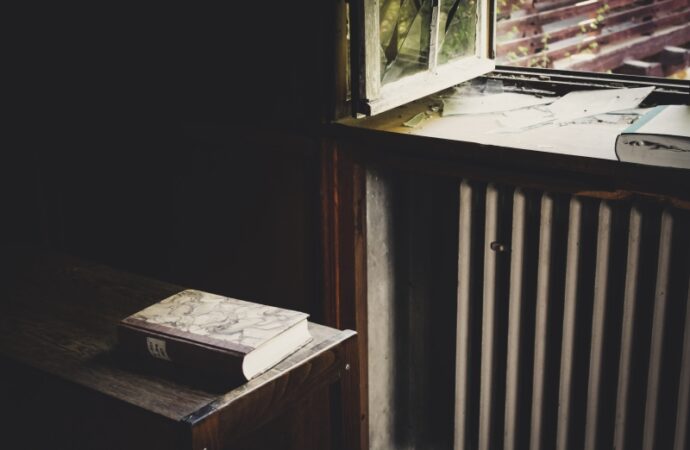The unfortunate truth is that virtually no one reads poetry anymore. Though there are many reasons why this may be the case, as a former educator, the common grievances I heard against poetry were that it was too abstract, complex, and generally wandering. But it is for these very reasons that poetry is one of the highest forms of human expression.
However, I have not always felt this way. I doubt that I read a full poem over the course of my four-year undergraduate career. It was not until I graduated and moved on that I started to take a more serious interest in reading and writing. Among my developing interests was poetry, primarily ignited by Robin Williams’ performance in Dead Poets Society. John Keating (played by Williams) teaches a group of prep-school boys that poetry is not just an activity, but it is a way of perceiving the world, a way of life.
The film contains one of the most compelling monologues I have ever heard about the potential role that poetry can play in our lives. Keating tells his students: “We don’t read and write poetry because it’s cute. We read and write poetry because we are members of the human race.” He goes on to say that medicine, law, business, and engineering are all worthy professions necessary to sustain life, but it is “poetry, beauty, romance, love, these are what we stay alive for.”
Keating goes on:
To quote from Whitman:
‘Oh me! Oh life! of the questions of these recurring,
Of the endless trains of the faithless, of cities fill’d with the foolish …
… What good amid these, O me, O life?Answer.
That you are here—that life exists and identity,
That the powerful play goes on, and you may contribute a verse.’That the powerful play goes on, and you may contribute a verse. What will your verse be?
This powerful monologue has stuck with me for a long time, and it is one I shared with virtually all of my students. However, the magic of poetry has to compete against uber-addictive, binge-worthy television shows and bite-sized social media clips that have enraptured young people over the past 15 years. While I do not view poetry as impenetrable or needlessly complex, it certainly requires time and effort. But what worthwhile thing in life does not require time and effort?
It is also important to understand that poetry should be viewed as a personal experience. The purpose is not necessarily to understand what the poet meant by this or that line, but rather, the purpose centers on what we get out of what we have read. A perfect example of this truth is revealed when we read Psalms, Proverbs, or even the heartbreaking story of Job. It is not necessary to know the inner workings of King David’s and Solomon’s lives for us to be emotionally struck by their poetic words.
We do not need to be intimately familiar with iambic pentameter or the Beat Poets to feel the emotional impact of a piece of poetry. Poetry is about reading the words and allowing whatever image or emotion wash over us—without apprehension of asking questions. It does not require that we keep story arcs and characters in order, as we would with a standard fictional story or blockbuster film. It is about opening ourselves up to the multitude of meanings and perceptions in the world; it is about paying attention.
If you are anything like me, you have asked the big questions before: What is the meaning of life? Does God exist? Does God love me? Does the universe have a beginning? And all of these questions have been addressed, in one way or another, by poets through the ages.
I am reminded of one of my favorite passages in Psalms 8, which reads: “When I consider thy heavens, the work of thy fingers, the moon and the stars, which thou hast ordained; What is man, that thou art mindful of him? and the son of man, that thou visitest him?”
Those two verses make one consider the incredible detail that God has put into His work—and the fact that he has created this infinitely large universe but still manages to be mindful of the smallest details of His creation. There is a whole philosophy embedded in those two verses and enough imagery to last a lifetime.
I believe poetry is seldom read nowadays because people seldom think deeply and emotionally about the issues that matter. Poetry extends beyond the borders of political and religious factions, narrative and character; it penetrates into the essence of human thought and feeling. Humanity will become a little less human if we lose poetry, and, unfortunately, it already has.
—
Image credit: PxFuel, NC
















5 Comments
G Froehle
April 25, 2023, 12:31 amInteresting thoughts, thanks!
REPLYBut, OK, the first thing might be to define "poetry"? When I started reading, poetry was The Raven, Woodsman, things that rhymed and scanned, a metric that rolled. Limericks even. I could later appreciate Eliot and them guys, lines that did not do so, but they still had a cadence of sorts : it wasn't prose.
Nowadays? Just string some letters and call it poetry. Meh.
And if I were good enough, I'd do so here. Might listen to Jethro Tull instead.
Jon@G Froehle
May 8, 2023, 4:00 pmPoetry is a way of writing in which the writer is especially attentive to the sound of the words and to economy of language, such that those features contribute to the meaning of the text.
REPLYPatricia Peirson
April 25, 2023, 1:13 amWell-stated and true. Thank you. I was similarly touched and inspired by those moments in Dead Poet's Society and would have loved a teacher like Mr. Keating. "O Captain! my Captain!" Where have such teachers gone?
REPLYKalikiano Kalei
April 25, 2023, 1:42 amAs an aspiring poet for most of my life (since undergrad days, at least, if not before), I have striven to create through the medium of poetry, personal interpretations of the very same things all poets are wont to dedicate their attentions to. I am therefore most grateful to my high school English Lit instructors for introducing the relevance of poetry that you reference, from early classical times onwards through the present. I was most fortunate, for I had professors and teachers who were themselves raised in the traditional academic manner…who studied Latin, gained an appreciation of the importance of Western Civilisation, and acquired a broad liberal arts background in that cultural milieu, long before Marcuse began spreading his form of insidiously poisonous Marxist dogma among today's contemporary pedagogs (who now teach present day university and college students).
As we all know or imagine, 'social media' has contributed exponentially to the demise of poetry among younger people these days, since as you note, understanding poetic expressionism requires focused thoughtfulness…something that electronic media discourages, devalues and depreciates generally. In fact social media discourages 'effort' itself and lessens the perceived importance of studied learning, hence social media and poetry are akin to the proverbial admixture of oil and water. How sad, how utterly tragic and how symptomatic of what is gone so awry among today's younger generations…who are so accustomed to having everything handed them on a silver salver, and having everything fully explained for them, thereby saving them from imagining anything more complicated than trying to come up with a unique, new selfie to post on-line!
Here's an example of one of my whimsical pieces, titled 'Ducks in Paper Trousers'. It may not rank up there with some of Walt's (Whitman) finer efforts, but hopefully it amuses (as intended)!
———————————-
The ducks are marching closer
In ranks and files and rows,
A feathery juggernaut on webbed feet
That have no heels or toes!
On and on, from far and near,
They streamed from everywhere,
But none were wearing sailor caps,
And their ducky legs weren't bare!
It was so bizarre to see them
That I had to stop and merely stare
While thoughts of being nibbled to death
Cleaved my chilly nighttime air!
As I glanced out of my window
Carefully staying out of sight,
How odd, I thought, that all wore pants;
The thought increased my fright!
Not one was waddling as they came near,
And not a single quack was heard
Which is most unusual for a duck
Since ducks are a noisy bird!
At last, I heard a feathery knock,
Faint at first upon my front door
It was no longer use denying then
That Hell’s ducks had come ashore!
Oh! leave me be, you fowl fiends!
I cried out in the dark,
And go back, go back, away from here
Go back to the local park!
Too late I heard the door give way,
With a fearsome sickening crash!
(There’s no mistaking a door collapsing
From that tsunami of a splash!)
But just at that very moment
When I’d felt the whole house shake,
I woke up sweating from my sleep
And found myself wide awake!
Of ducks there was no evidence,
Nor watery pools, or what!
I realised then, with great chagrin
This dream came from my gut!
The blame must be fully laid,
I fear and see so clearly now,
It was that wretched slice of pizza
Had brought this dream I disallow!
REPLYAnabell@Kalikiano Kalei
July 31, 2024, 4:17 amThis is the best article I've read all year, I am a big fan of Dead Poets Society, probably one of the most underrated movies in film history. Keep doing what you doing, never stop writing.
REPLY– anabell